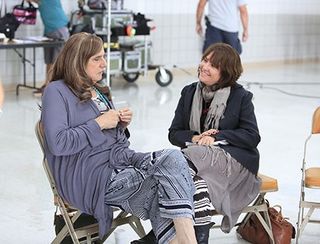Female Directors See Action at Emmys

Related: Epix Preps Lear’s Deep-Digging ‘America Divided’
The number of non-white actors snagging major Emmys, including Regina King of American Crime, Aziz Ansari of Master of None and Courtney B. Vance of The People v. O.J. Simpson, continues to differentiate television from a film industry fighting to put to rest its OscarsSoWhite tag. Two of the top directing prizes went to females. That milestone was notable, but hardly historic; in fact it was the second year in a row in which two females claimed the major directing Emmys.
Jill Soloway, creator of Amazon’s Transparent, beat out Ansari, Alec Berg and Mike Judge (Silicon Valley) and three directors from Veep for best directing in a comedy series. From the podium, the activism-minded director was unequivocal about upending the status quo in Hollywood—and beyond. “We need to stop violence against transgender women and topple the patriarchy,” she said. “Topple the patriarchy!”
A bit later, Susanne Bier won for best directing in a limited series, movie or dramatic special. Directing all six episodes of AMC spy thriller The Night Manager, she too beat out heavy hitters, including Noah Hawley of Fargo and Ryan Murphy, Anthony Hemingway and John Singleton, all of The People v. O.J. Simpson.
A native of Denmark, Bier has an accomplished film resume overseas, and her Emmy showed she’s transitioned smoothly to television. She recently told B&C she was eager for the possibilities that TV represented when it came to adapting John LeCarre’s spy novel. “I was attracted by the possibility of doing six hours, where you can tell a story with a lot of richness, as opposed to a two-hour feature,” she said.
Women ruled the same categories last year—Soloway for comedy directing and Lisa Cholodenko of HBO’s Olive Kitteridge for limited series.
The other major directing Emmys last week went to Miguel Sapochnik of Game of Thrones for drama and Thomas Kail and Alex Rudzinski of Grease: Live for variety special.
Broadcasting & Cable Newsletter
The smarter way to stay on top of broadcasting and cable industry. Sign up below
Evangeline Morphos, professor in the film department at Columbia University, notes how films are financed based on their director, which often prevents women from getting the chance to helm a major project. “In television, the financing is in place with the network and the studio,” she said. “There’s more opportunity, with many different routes in.”
The Changing Face of Television
Diversity continues to be a scorching issue in television, boiling over a few times at the TCA press tour in August. FX Networks president/CEO John Landgraf, citing a Variety study, noted how white males comprise between 31%-35% of the U.S. population, yet represented between 67%- 88% of TV directors, depending on the network. Landgraf penned a letter to FX’s showrunners, asking them to bring in more diverse directors. Since the campaign began, 49% of FX’s episodic directors are white males and 51% are female and/or diverse.
“We hope the example of FX more than quadrupling our percentage of diverse and female directors in such a short time sends a message to our whole industry that it is well past time for change to happen,” said Landgraf. There’s plenty of room for gender equality growth across the board. Women directed 17% of scripted episodes last season, per the Directors Guild of America, up from 16% the year before.
Promoting the new season of Transparent in New York, Soloway challenged the broader media to be more inclusive. “Women, people of color, queer people are completely underrepresented in all media across the board,” she said. “Not just film and television but writing. As somebody with access because of my class, because of my race, anything anybody can do to remind me of how I can help other people get to the place where they’re representing themselves.…”
Soloway, who often speaks of advocating for “otherized” people, decried the writers room as a longtime male bastion. The director offered a compelling peek inside her directorial style. To bring about the spontaneity and authenticity that has made Transparent an unlikely hit, Soloway spoke of doing what would be the final take for most directors—the wacky, “let’s screw one up” take—and moving it to the front of the queue. “I’m always attempting to go for realest possible feeling when we’re shooting,” Soloway said. “I really want it to feel like a documentary.”
Michael Malone, senior content producer at B+C/Multichannel News, covers network programming, including entertainment, news and sports on broadcast, cable and streaming; and local broadcast television. He hosts the podcasts Busted Pilot, about what’s new in television, and Series Business, a chat with the creator of a new program, and writes the column “The Watchman.” He joined B+C in 2005. His journalism has also appeared in The New York Times, The Philadelphia Inquirer, Playboy and New York magazine.

